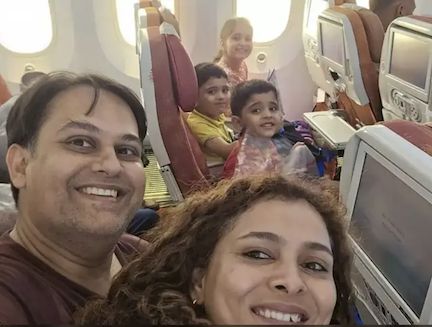Mortality Captured in a Selfie
For six years Dr. Pratik Joshi had been dreaming of a new life for himself and his family. He had been living and working in London, preparing to bring his wife and children there to join him. After years of hard work, the time had finally come. He flew to western India to retrieve his family to begin living their dream.
Just two days prior to departure for the UK, his wife, Dr. Komi Vayas resigned her position, packed up their belongings, and prepared her children for the flight to their new home.
They then boarded Air India flight 171 and snapped this selfie of their happy, hopeful family as they anticipated departure for the future that awaited them.

(Image, X/@theskindoctor13)
Then, just 32 or so seconds after taking off, the plane began to fall from the sky, crashing into a residential neighbourhood in Ahmedabad. The crash killed all 242 passengers on board, including Joshi, Vayas, and their three young children.
We make our plans. We dream our dreams. Yet ... Life is short, fragile, unexpected. While we plan for or dream of a thousand tomorrows, we cannot know what tomorrow, or even the next 32 seconds will bring.
Make your plans. Dream your dreams. But do all in accordance with the will and heart of the Lord, remembering that "[we] are a mist that appears for a little time and then vanishes."
"The heart of man plans his way, but the Lord establishes his steps" (Proverbs 16:9, ESV).
"Many are the plans in the mind of a man, but it is the purpose of the Lord that will stand" (Proverbs 19:21).
"Come now, you who say, 'Today or tomorrow we will go into such and such a town and spend a year there and trade and make a profit'— yet you do not know what tomorrow will bring. What is your life? For you are a mist that appears for a little time and then vanishes. Instead you ought to say, 'If the Lord wills, we will live and do this or that'" (James 4:13-15, ESV).
May God comfort the hearts of the grieving in the wake of this tragedy. May they find HIM as they contemplate their own mortality. So may we all.
Jesus Calls Us to Desire More
When I was a boy, I always looked forward to our summer trips from San Francisco to West Texas to spend vacation time with extended family. My two younger brothers and I would pile into our un-air-conditioned car, anxious to begin the long trek across the Southwest. At the end of each day’s journey, the three of us would beeline our way to the hotel pool to re-hydrate—something we really looked forward to after hours of being blasted in the back seat by the hot desert air. These were great adventures filled with the excitement of seeing new places and the extravagance of eating out (something we never did back home).
One year during our journey, my youngest brother did something completely out of character for his normally compliant nature. Despite a tight budget and strict instructions to the contrary, James defiantly placed the same order every time we stopped to eat. “I’ll have what Dad is having,” he would insist. Apparently, my little brother had noticed that the plate of food placed in front of our father always looked a lot more appealing than the one typically placed in front of him. That was all it took. From then on, all he wanted was what our father was having. At five years of age, my little brother didn’t know much, but he knew that anything Dad ordered would be better than what he knew to order off the Kiddie Menu. Genius!

If only we were that smart about what we desired in life. If we were, we would stop setting our hearts on things that are certain to disappoint us and start dreaming of things that promise to bring lasting satisfaction. We would forget about the Kiddie Menu, where the portions and satisfaction are limited, and turn instead to God. We would ask our Heavenly Father to do the ordering for us, trusting that His choices would be bigger, better and more satisfying. We would order what He was having—not mere happiness, but blessedness!
This is precisely the prescription we find in the Beatitudes. Rather than calling us to desire less, Jesus calls us to desire more. Rather than asking us to let go of our dreams, Jesus exhorts us to dream bigger. Rather than expecting us to be satisfied with mere happiness, Jesus invites us to experience what it is to be blessed. Happiness is what we order for ourselves, while blessedness is what we get when we let God order for us.
Obedience Can Take You to the Moon
Swindoll retells the following story of his conversation with General Charles M. Duke and his experiences walking on the moon with the Apollo 16 mission:
I asked, “Once you were there, weren’t you free to make your own decisions and carry out some of your own experiments…you know, sort of do as you pleased – maybe stay a little longer if you liked? He smiled back, “Sure, if we didn’t want to return to earth!”
He then described the intricate plan, the exact and precise instructions, the essential discipline, the instant obedience that was needed right down to the split second. By the way, he said they had landed somewhat “heavy” when they touched down on the moon. He was referring to their fuel supply. They had plenty left. Guess how much. One minute. They landed with sixty seconds of fuel remaining. Talk about being exact! I got the distinct impression that a rebel doesn’t fit inside a spacesuit. Whoever represents the United States in the space program must have an unconditional respect for authority.
Some believe that obedience gets in the way of accomplishing their goals and dreams in life; that one must have a little rebellion to succeed. In reality, our love for God and our desire to obey only Him is what will "take us to the moon and back!"
"Keep this Book of the Law always on your lips; meditate on it day and night, so that you may be careful to do everything written in it. Then you will be prosperous and successful" (Joshua 1:8).
Chris Horton